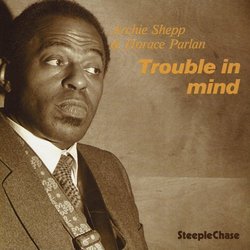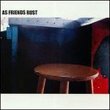| All Artists: Archie Shepp, Horace Parlan Title: Trouble in Mind Members Wishing: 2 Total Copies: 0 Label: Steeplechase Release Date: 6/28/1994 Album Type: Import Genres: Jazz, Pop Style: Avant Garde & Free Jazz Number of Discs: 1 SwapaCD Credits: 1 UPCs: 716043113927, 723721850227 |
Search - Archie Shepp, Horace Parlan :: Trouble in Mind
 | Archie Shepp, Horace Parlan Trouble in Mind Genres: Jazz, Pop
|
Larger Image |
CD DetailsSimilar CDs
|
CD ReviewsCarved in granite Dai Kaili | Beijing, China | 04/26/2003 (5 out of 5 stars) "Shepp, who is also a playwright, brings an immense sense of dramatic gesture to jazz. There is no finer statement of the blues rhetoric than "Backwater Blues" on this CD, and no saxophone notes were ever more dignified, carved out of rock than those on 'St James Infirmary.' The soprano playing (more or less every other track) is also powerful and individual. Horace Parlan (piano) is a marvel of elegant, dignified rhythmic balance, on this as on "Goin' Home," making these two wonderful additions to the jazz duet library. It is great to see these titles on www.Amazon.com, where their absence for several years really made one wonder." A deep pool of goodness Isaac Laughlin | 08/06/2005 (5 out of 5 stars) "Archie Shepp's best known records could be described as 'important'. This album is not similarly important in a political sense, nor in the sense that it charts new territory for jazz music. It is however a beautiful record.
It's easy to imagine Mr. Shepp and Mr. Parlan playing these songs after a typical fiery gig at four am with chairs on tables as their only audience, aside from a lone broom-wielder. It's a romantic idea, but not any more romantic than the music on this album. Archie Shepp's usual tendency towards pyrotechnics and avant-adventures makes this album's sparce no nonsense treatments of gospel standards that much more fascinating. While a survey of Mr. Shepp's discography will quickly reveal that he was well versed in all jazz idioms, it's nonetheless remarkable to hear him confining himself to a much earlier set of styles than those which made him (or he made) famous (see Four for Trane, Live in San Fransico, Fire Music). Here it's Ben Webster that comes across as the primary influence (he is more himself -albeit restrained- on soprano), and Mr. Shepp demonstrates that he is very comfortable in this idiom, without sounding derivative. That Horace Parlan would make a record like this is less surprising, and on some tracks he serves to rein Mr. Shepp in when he seems to be at risk of overstepping the bounds of the traditional songs. This push and pull between the players makes for an interesting record. One that both those who love, and those who can't stand Mr. Shepp's better known records, will find enjoyable." |

 Track Listings (12) - Disc #1
Track Listings (12) - Disc #1